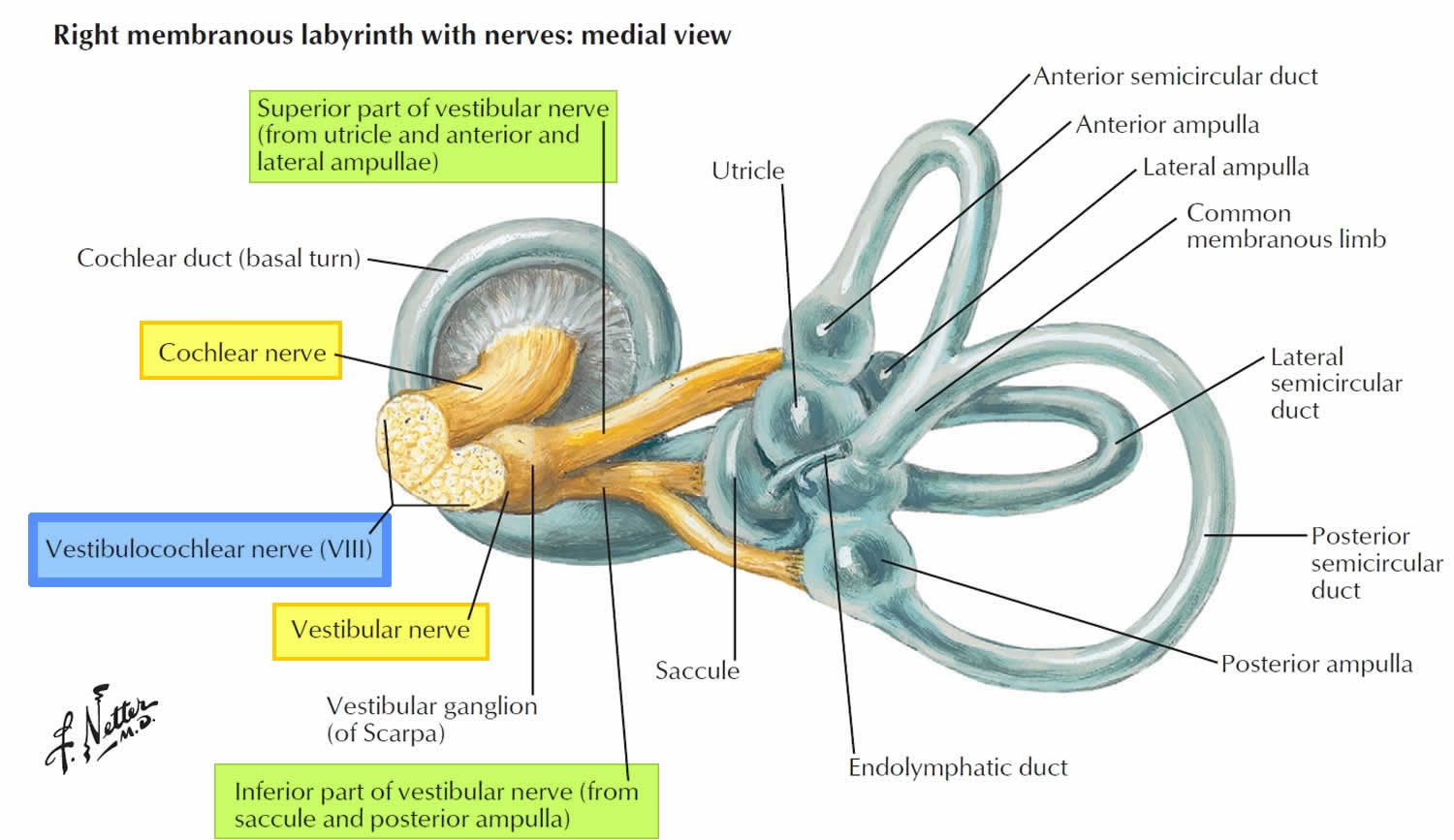Makindo Medical Notes"One small step for man, one large step for Makindo" |
|
|---|---|
| Download all this content in the Apps now Android App and Apple iPhone/Pad App | |
| MEDICAL DISCLAIMER: The contents are under continuing development and improvements and despite all efforts may contain errors of omission or fact. This is not to be used for the assessment, diagnosis, or management of patients. It should not be regarded as medical advice by healthcare workers or laypeople. It is for educational purposes only. Please adhere to your local protocols. Use the BNF for drug information. If you are unwell please seek urgent healthcare advice. If you do not accept this then please do not use the website. Makindo Ltd. |
Vestibulocochlear Nerve (Cranial Nerve VIII)
-
| About | Anaesthetics and Critical Care | Anatomy | Biochemistry | Cardiology | Clinical Cases | CompSci | Crib | Dermatology | Differentials | Drugs | ENT | Electrocardiogram | Embryology | Emergency Medicine | Endocrinology | Ethics | Foundation Doctors | Gastroenterology | General Information | General Practice | Genetics | Geriatric Medicine | Guidelines | Haematology | Hepatology | Immunology | Infectious Diseases | Infographic | Investigations | Lists | Microbiology | Miscellaneous | Nephrology | Neuroanatomy | Neurology | Nutrition | OSCE | Obstetrics Gynaecology | Oncology | Ophthalmology | Oral Medicine and Dentistry | Paediatrics | Palliative | Pathology | Pharmacology | Physiology | Procedures | Psychiatry | Radiology | Respiratory | Resuscitation | Rheumatology | Statistics and Research | Stroke | Surgery | Toxicology | Trauma and Orthopaedics | Twitter | Urology
Related Subjects: |Olfactory Nerve |Optic Nerve |Oculomotor Nerve |Trochlear Nerve |Trigeminal Nerve |Abducent Nerve |Facial Nerve |Vestibulocochlear Nerve |Glossopharyngeal Nerve |Vagus Nerve |Accessory Nerve
The vestibulocochlear nerve, also known as cranial nerve VIII, is responsible for transmitting sound and equilibrium (balance) information from the inner ear to the brain. It has two main components: the vestibular nerve and the cochlear nerve.
Anatomy of the Vestibulocochlear Nerve
- Origin :
- Emerges from the pontomedullary junction of the brainstem.
- Course :
- Travels through the internal acoustic meatus alongside the facial nerve (cranial nerve VII).
- Divides into the vestibular and cochlear nerves within the inner ear.
Components of the Vestibulocochlear Nerve
- Vestibular Nerve :
- Responsible for transmitting information related to balance and spatial orientation.
- Receives input from the semicircular canals, utricle, and saccule in the inner ear.
- Cochlear Nerve :
- Responsible for transmitting auditory information.
- Receives input from the hair cells in the cochlea of the inner ear.
Functions of the Vestibulocochlear Nerve
- Auditory Function :
- Transmits sound signals from the cochlea to the brain.
- Enables the perception of sound and interpretation of auditory information.
- Equilibrium Function :
- Transmits balance and spatial orientation information from the vestibular apparatus to the brain.
- Helps maintain balance, posture, and coordination of head and eye movements.

Clinical Relevance
- Vestibular Neuritis :
- Inflammation of the vestibular nerve, often due to a viral infection.
- Symptoms: Vertigo, dizziness, balance disturbances, nausea, and vomiting.
- Treatment: Includes vestibular rehabilitation therapy and medications to manage symptoms.
- Labyrinthitis :
- Inflammation of both the vestibular and cochlear nerves, typically due to infection.
- Symptoms: Vertigo, hearing loss, tinnitus, and balance issues.
- Treatment: Often involves antibiotics (if bacterial), corticosteroids, and symptomatic relief.
- Acoustic Neuroma (Vestibular Schwannoma) :
- Benign tumour on the vestibulocochlear nerve.
- Symptoms: Gradual hearing loss, tinnitus, balance problems, and sometimes facial numbness.
- Treatment: Monitoring, surgical removal, or radiation therapy, depending on the size and growth of the tumour.
- Meniere's Disease :
- A disorder of the inner ear causing episodes of vertigo, tinnitus, hearing loss, and a feeling of fullness in the ear.
- Treatment: Lifestyle changes, medications, and in severe cases, surgical interventions.
- Sensorineural Hearing Loss :
- Caused by damage to the cochlear nerve or hair cells in the cochlea.
- Symptoms: Partial or complete loss of hearing in the affected ear.
- Treatment: Hearing aids, cochlear implants, or other assistive devices.
Summary
The vestibulocochlear nerve is crucial for hearing and balance, transmitting auditory information from the cochlea and equilibrium information from the vestibular apparatus to the brain. It has two main components, the vestibular nerve and the cochlear nerve. Disorders affecting this nerve can lead to symptoms such as hearing loss, vertigo, and balance issues, requiring various therapeutic interventions.